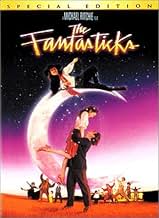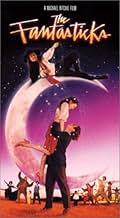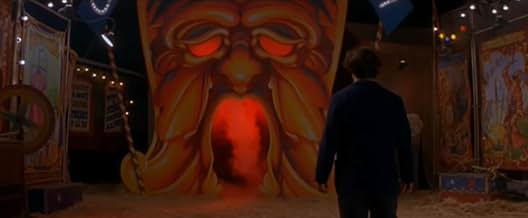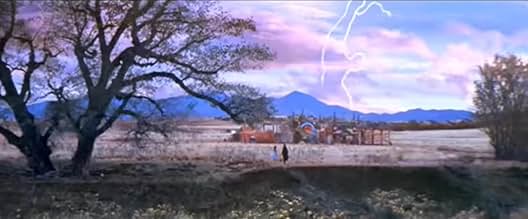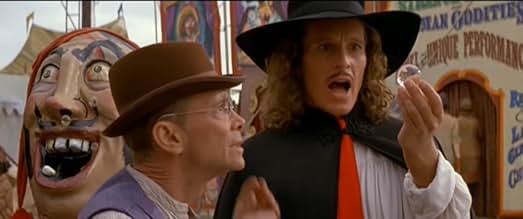IMDb RATING
5.7/10
1.5K
YOUR RATING
A mysterious fair that comes to a small community in the countryside could make real the illusions of two teenagers.A mysterious fair that comes to a small community in the countryside could make real the illusions of two teenagers.A mysterious fair that comes to a small community in the countryside could make real the illusions of two teenagers.
Joey McIntyre
- Matt
- (as Joe McIntyre)
Tony Cox
- His Assistant
- (as Joe Anthony Cox)
Featured reviews
Given the resources and talent involved, one would have hoped for much more, but the movie lacks the sparkle of even a mediocre stage production.
Joel Grey as Bellamy phoned in his performance. Even making allowances for the fact that he was 63 when he made the movie, his performance was remarkably lifeless and his singing was unremarkable, even strained at times. Brad Sullivan as Hucklebee was even worse, flat performing and flat singing. Joseph McIntyre as The Boy turned in a passable performance, though he didn't really do the role justice. Jean Louisa Kelley as The Girl was perhaps the brightest spot in the lineup, delivering an adequate if not inspired performance.
Jonathon Morris was sadly miscast as El Gallo. He had the agility and strength needed for such a physical role, but lacked the proper menacing look needed. His acting was, if not totally flat, at least rather plastic. And the one song he needed to really carry -- "Try to Remember" -- he didn't have the voice for.
The staging was the most inspired part of the movie. Simply filming the minimalistic stage production wouldn't have worked, but the movie's set -- two homes and a carnival set in the prairie -- was sufficiently minimalistic to honor the play's concept while still bending to the requirements of the big screen. This facilitated devices that helped to flesh out some of the more ambiguous scenes in the play.
The script was unfortunately a Bowdlerized version. The song substituted for "The Rape Ballet" was incredibly uninspired and inconsistent. It was almost as if the writer wanted the substitute to be bad, in retaliation for pulling the original piece. In addition to "The Rape Ballet" substitution, several other songs were changed from the original, generally not for the better, and the delightful "Plant a Radish" was omitted entirely.
Perhaps the saddest change of all from the stage play was that the role of The Narrator was essentially omitted, and with it some of the most enchanting poetry in the script.
Joel Grey as Bellamy phoned in his performance. Even making allowances for the fact that he was 63 when he made the movie, his performance was remarkably lifeless and his singing was unremarkable, even strained at times. Brad Sullivan as Hucklebee was even worse, flat performing and flat singing. Joseph McIntyre as The Boy turned in a passable performance, though he didn't really do the role justice. Jean Louisa Kelley as The Girl was perhaps the brightest spot in the lineup, delivering an adequate if not inspired performance.
Jonathon Morris was sadly miscast as El Gallo. He had the agility and strength needed for such a physical role, but lacked the proper menacing look needed. His acting was, if not totally flat, at least rather plastic. And the one song he needed to really carry -- "Try to Remember" -- he didn't have the voice for.
The staging was the most inspired part of the movie. Simply filming the minimalistic stage production wouldn't have worked, but the movie's set -- two homes and a carnival set in the prairie -- was sufficiently minimalistic to honor the play's concept while still bending to the requirements of the big screen. This facilitated devices that helped to flesh out some of the more ambiguous scenes in the play.
The script was unfortunately a Bowdlerized version. The song substituted for "The Rape Ballet" was incredibly uninspired and inconsistent. It was almost as if the writer wanted the substitute to be bad, in retaliation for pulling the original piece. In addition to "The Rape Ballet" substitution, several other songs were changed from the original, generally not for the better, and the delightful "Plant a Radish" was omitted entirely.
Perhaps the saddest change of all from the stage play was that the role of The Narrator was essentially omitted, and with it some of the most enchanting poetry in the script.
I think the defining moment of "The Fantasticks" is the presentation of the song, "It Depends on What You Pay." In this film, that title is the only line from the original song that makes it into the film. That's because an alternate title of the original song is "Rape," the word being defined in the musical as "abduction," not the darker meaning. That explanation, curiously, remains in the film, but the other lyrics, describing different kinds of "rapes" are excluded. The exclusion of those lyrics is not surprising--what seemed only risque in 1960 now seems not only politically incorrect but surprisingly callous and insensitive. The fact, however, that one song from a 1960 Off-Broadway musical cannot fit into a 1995 movie, doesn't necessary mean the rest of the musical can.
Much of what was classic in the past no longer fits into contemporary thought. Updating, however, cannot necessarily preserve what made it into a classic in the first place, and it is not just "It Depends on What You Pay" that's been updated.
Speaking of the original "Fantasticks" as a whole, the score is something I fell in love with 34 years ago. The simplicity of it--scored basically for harp and piano--was a revelation compared to overscored Broadway shows. It also accentuated the music's occasional harmonic surprises, which seem to look forward to Stephen Sondheim. More than this, the minimalist staging--no real sets or props--also was very foward-looking, and assisted in making more timeless what might now seem like a very timebound story. I think the fact the original play has run non-stop for 41 years verifies this.
All this is lacking in the film. Jonathan Tunick's updated orchestrations are good, but they blunt the impact of the score. In place of a bare bones stage, we now see location shooting and a huge carnival set. Other songs are abridged, and dialogue omitted. Maybe this had to be done to adapt the musical into something that didn't seem just a filmed stage event and adapt it for modern audiences, but it isn't really "The Fantasticks" anymore, and it shows on the screen. The film comes off hopelessly hokey and contrived. Worse, it comes off as the very thing I believe I remember Luisa asks God not to make her in the play's introduction to "Just Once": ordinary.
Perhaps this is a film that should never have been attempted. And perhaps someone will have the foresight to release the 1960's TV version on video soon.
Much of what was classic in the past no longer fits into contemporary thought. Updating, however, cannot necessarily preserve what made it into a classic in the first place, and it is not just "It Depends on What You Pay" that's been updated.
Speaking of the original "Fantasticks" as a whole, the score is something I fell in love with 34 years ago. The simplicity of it--scored basically for harp and piano--was a revelation compared to overscored Broadway shows. It also accentuated the music's occasional harmonic surprises, which seem to look forward to Stephen Sondheim. More than this, the minimalist staging--no real sets or props--also was very foward-looking, and assisted in making more timeless what might now seem like a very timebound story. I think the fact the original play has run non-stop for 41 years verifies this.
All this is lacking in the film. Jonathan Tunick's updated orchestrations are good, but they blunt the impact of the score. In place of a bare bones stage, we now see location shooting and a huge carnival set. Other songs are abridged, and dialogue omitted. Maybe this had to be done to adapt the musical into something that didn't seem just a filmed stage event and adapt it for modern audiences, but it isn't really "The Fantasticks" anymore, and it shows on the screen. The film comes off hopelessly hokey and contrived. Worse, it comes off as the very thing I believe I remember Luisa asks God not to make her in the play's introduction to "Just Once": ordinary.
Perhaps this is a film that should never have been attempted. And perhaps someone will have the foresight to release the 1960's TV version on video soon.
So far, I have seen more than five stage productions of "the Fantasticks" including one at the Sullivan Street Playhouse back in 1962; and I am going to see another one at the Snapple Theater Center (Jerry Orbach Theater) in New York. Yes, folks, as of this date "The Fantasticks" is still playing. There was a short interim when the Sullivan Street Playhouse was torn down to make way for a high rise in 2002.
Most of the reviews of the movie are indicative of two views. If one hasn't seen "The Fantasticks" on stage or heard the original score in its entirety, the movie "ain't" that bad. However, after more than 50 years running, and after thousands of international and summer stock productions, the play has had a lot of critically biased audience when they view the film. It might have been better if the makers of the movie had just filmed a stage production. The results might have been the least expensive and longest running film ever produced.
Most of the reviews of the movie are indicative of two views. If one hasn't seen "The Fantasticks" on stage or heard the original score in its entirety, the movie "ain't" that bad. However, after more than 50 years running, and after thousands of international and summer stock productions, the play has had a lot of critically biased audience when they view the film. It might have been better if the makers of the movie had just filmed a stage production. The results might have been the least expensive and longest running film ever produced.
The pluses for this are terrific art and production design which is beautifully displayed by the cinematography of Fred Murphy but pretty pictures only go so far. The piece's other strong suit is a fine score with many lovely songs however they are compromised by being given to the two leads who have thin reedy voices without distinction or subtlety and the tunes suffer because of it. The score was a favorite of the young Barbra Streisand and she recorded several of the numbers, listen to her versions of Much More, Soon It's Gonna Rain and particularly I Can See It and you'll understand what has been lost in the pallid interpretations offered here. Alas it is of no help that the same romantic leads share zero chemistry on screen with McIntyre practically disappearing from the screen, so bland is his presence. The best work is turned in by Brad Sullivan and Joel Grey but their parts are small and Grey is especially wasted. Catch the live show instead.
Ok, maybe it can be argued that it is simply not possible to make a decent film of this wonderful musical. But even given that, one certainly could have done a better job than this. I rate this at the bottom of the pile of stage to screen transfers along with the dreadful Bye, Bye, Birdie and Paint Your Wagon.
First, why cut "Try to Remember" (the one song that practically everyone knows) from the beginning of the picture (and trim it at the end). It establishes the whole mood of the show - calling the audience to remember back when they first fell in love and the magic of that moment. This show just opens with Bellamy sewing (?)
Then, because they wanted to make it more like a traditional movie musical, they cut the narrator - and with him went most of the wonderful dialogue much of it spoken in poetry and verse (note the absence of the speech before "Soon Its Gonna Rain"["You wonder how these things begin...]; trimmed down is the "Curious Paradox" speech the most important part being cut out; gone is Louisa's self-description that sets up "Much More" as well as Matt's intro to "Metaphor"; and most important of all the speech opening the second act is gone which explains much of what the story is about).
Gone also are all the wonderful metaphors (the whole idea behind the song of the same title)that prevade the show - the gardening metaphors are gone (hence why "Plant a Radish" was cut, though one wonders why they left in "This Plum is Too Ripe"); gone also is the metaphor of the wall (one of the most important in the show, leading to the most significant, if not most enigmatic, line in the play "Leave the wall, you must always leave the wall.")
Not surprisingly the mute is cut, but other characters are changed as well. With the narrator gone, the motive of El Gallo is unclear. Why is he doing these things? Why does he say the curious paradox speech if he is not going to explain why he hurt them (and himself)? Only the part of Henry remains fairly faithful to the original play (even Mortimer is given over to Teller as a non-speaking role). Louisa is played too simperingly sweet rather than as a self-absorbed teenage girl fascinated more with the idea of being in love than actually loving Matt. Her transition at the end (from "I am love" originally in Metaphor to "You are love" at the reprise) makes no sense in this version.
Yes, most of the songs are there. But they are often trimmed down, replaced with safer songs (like the absolutely horrible "Abductions" replacing the clever "It Depends on What you Pay) or the lyrics are completely rewritten("Metaphor"). I know the arguments for replacing "Depends", but I have directed the show twice and played El Gallo once and have not ever heard a complaint about the song - you simply have to introduce it correctly.
One wonders why they even decided to film this show if they were going to change it so much. I believe a fairly decent film might have been made if they had stayed with what they had. Instead they decided to go Hollywood with it and the result is nothing like the original story. No wonder it stayed in the can for 6 years before being released. It probably should have stayed there. One big disappointment.
First, why cut "Try to Remember" (the one song that practically everyone knows) from the beginning of the picture (and trim it at the end). It establishes the whole mood of the show - calling the audience to remember back when they first fell in love and the magic of that moment. This show just opens with Bellamy sewing (?)
Then, because they wanted to make it more like a traditional movie musical, they cut the narrator - and with him went most of the wonderful dialogue much of it spoken in poetry and verse (note the absence of the speech before "Soon Its Gonna Rain"["You wonder how these things begin...]; trimmed down is the "Curious Paradox" speech the most important part being cut out; gone is Louisa's self-description that sets up "Much More" as well as Matt's intro to "Metaphor"; and most important of all the speech opening the second act is gone which explains much of what the story is about).
Gone also are all the wonderful metaphors (the whole idea behind the song of the same title)that prevade the show - the gardening metaphors are gone (hence why "Plant a Radish" was cut, though one wonders why they left in "This Plum is Too Ripe"); gone also is the metaphor of the wall (one of the most important in the show, leading to the most significant, if not most enigmatic, line in the play "Leave the wall, you must always leave the wall.")
Not surprisingly the mute is cut, but other characters are changed as well. With the narrator gone, the motive of El Gallo is unclear. Why is he doing these things? Why does he say the curious paradox speech if he is not going to explain why he hurt them (and himself)? Only the part of Henry remains fairly faithful to the original play (even Mortimer is given over to Teller as a non-speaking role). Louisa is played too simperingly sweet rather than as a self-absorbed teenage girl fascinated more with the idea of being in love than actually loving Matt. Her transition at the end (from "I am love" originally in Metaphor to "You are love" at the reprise) makes no sense in this version.
Yes, most of the songs are there. But they are often trimmed down, replaced with safer songs (like the absolutely horrible "Abductions" replacing the clever "It Depends on What you Pay) or the lyrics are completely rewritten("Metaphor"). I know the arguments for replacing "Depends", but I have directed the show twice and played El Gallo once and have not ever heard a complaint about the song - you simply have to introduce it correctly.
One wonders why they even decided to film this show if they were going to change it so much. I believe a fairly decent film might have been made if they had stayed with what they had. Instead they decided to go Hollywood with it and the result is nothing like the original story. No wonder it stayed in the can for 6 years before being released. It probably should have stayed there. One big disappointment.
Did you know
- TriviaThe movie was filmed in 1995, and shelved for five years. The released version was re-edited by Francis Ford Coppola with the consent of director Michael Ritchie.
- Alternate versionsThe DVD includes 3 deleted songs
- Plant a Radish, Get a Radish.
- It Depends on What You Pay.
- Try to Remember
- SoundtracksOverture
Music by Harvey Schmidt
Details
- Release date
- Country of origin
- Language
- Also known as
- Фантастики
- Filming locations
- Production companies
- See more company credits at IMDbPro
Box office
- Budget
- $10,000,000 (estimated)
- Gross US & Canada
- $49,666
- Opening weekend US & Canada
- $24,176
- Sep 24, 2000
- Gross worldwide
- $49,666
Contribute to this page
Suggest an edit or add missing content



